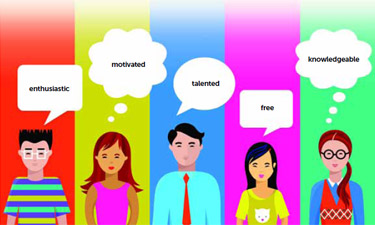 The mutually beneficial relationship between park and recreation agencies and academic institutions is well established. Recreation education programs routinely send students on internship opportunities and organize teams of extra-credit seekers for volunteer events. Recreation students make great staff members—they’re (almost always) enthusiastic, motivated, and ready to put their classroom knowledge to good use.
The mutually beneficial relationship between park and recreation agencies and academic institutions is well established. Recreation education programs routinely send students on internship opportunities and organize teams of extra-credit seekers for volunteer events. Recreation students make great staff members—they’re (almost always) enthusiastic, motivated, and ready to put their classroom knowledge to good use.
Recreation students can do many amazing things for free. Their instructors are invested in student success and rarely let them fail. After all, there are learning objectives to reach and a university reputation to uphold. Students attend class to learn how to create quality products, and their fantastic labor cost doesn’t solely apply to entry-level positions and volunteer opportunities.
Last year, my educational institution met with a municipal park administration to discuss their recent marketing study. Commissioned by the city, the final report was professionally spiral-bound, with all the necessary note tabs and a plastic cover. The content, however, was obviously and severely lacking for any reader who understands proper recreation research. While the parks director proudly stated that it had only cost $5,000 to hire a local marketing firm for the document, our first thought was, “What a waste of $5,000.” We could have done it for free. We do it all the time.
Have you heard about this fantastic (large, easy, new) grant? Maybe not, because you have to set next month’s schedule, answer 40 emails, and call the mayor back. Wouldn’t it be wonderful to have a team of volunteer grant writers, who could independently identify, secure, and help administer recreation funds for your agency? There certainly is such a team available—they’re all enrolled in a budgeting and grant writing class, offered this semester at your nearby university’s recreation education program.
The course instructor, who has a graduate degree and grant writing experience, needs opportunities for his or her students to write their first grant. If you allow students the opportunity to write grants for you, they will benefit from the practical application of their classroom knowledge, and your agency will benefit financially.
By now your agency has a Facebook page. Does it have a Twitter account? How often do you tweet? Do your followers find your tweets effective or annoying? What about Groupon? Could offering discounts increase your program’s participation? Or LivingSocial? Or Google Sites? Can you really be expected to manage your agency’s online presence in 10 different locations, while still accomplishing what you’re supposed to do in real life?
Yes. Find a student, or a classroom of students, who are studying recreation program promotion and marketing. A recent student of mine spent a semester helping a start-up therapeutic recreation agency gain clientele and establish itself in the community by monitoring and promoting its online presence. It was a great resume builder for her and a significant help to her recreation practicum site.
How long has it been since your agency adequately surveyed its constituency? Target market analysis can be time consuming and costly if done correctly. Good thing all COAPRT-accredited undergraduate programs offer a class in program assessment and evaluation. In my graduate work, I designed and supervised a citizen survey for a new park and recreation department that did not have a budget line for the project. The University of Mississippi graduate school generously funded every penny we asked for.
For more than a decade, my recreation education program has organized and executed a family-friendly fundraising event in conjunction with the park commission. This yearly project is great for the community, the recreation agency, the students, and the university. Partnerships between education programs and recreation agencies benefit everyone involved.
Students gain practical experience and receive coaching and instruction on creating quality products from their instructors. These real-life projects also make perfect work examples for the students’ professional portfolios when they graduate and begin their working careers. Your agency, in turn, gets a first look at the promising graduates and great work done for a great price.
On the academic side, course instructors love when agencies can provide guest speakers for their classrooms and possible jobs for their students. The university public relations team can also endorse the good deeds that the student body is performing. Any excuse to encourage students to get off campus and give back to their community is fantastic promotion for both the recreation program and the university as a whole.
My students and colleagues have saved thousands of taxpayer dollars while providing top-quality products. We have created beautiful websites, promotional YouTube videos, and questionnaires for recreation agencies. We have planned and run wildly successful events and conducted citizen surveys. We have held certification workshops, community fundraisers, and marketing analyses, and we are constantly looking for new projects.
If your agency doesn’t yet have a strong relationship with a university department, start the networking rounds at the 2012 NRPA Congress. Please reach out to a local recreation program chair and ask for advice or a referral. They will be delighted to speak with you and eager to help.
If you do have a professional relationship established with a local recreational education department, great! Is there anything else that students can do for you? Whether conducting research, writing grants, planning events, or designing your website, your agency’s need is a student’s opportunity. You will save a lot of money and secure a top-quality product by utilizing the knowledge and talents of park and recreation students!
Anna Pechenik Mausolf is the 2012 NRPA Outstanding Graduate Student Award recipient. She holds degrees from Central Michigan University and the University of Mississippi. She works as a college instructor in park and recreation management.

